Omicron could see one in six NHS Wales staff off, says boss
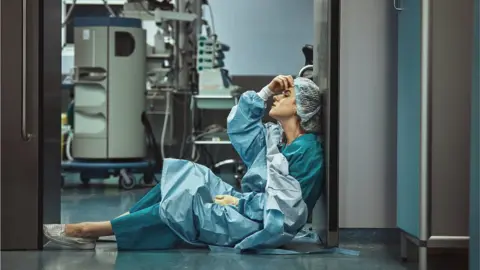 Getty Images
Getty ImagesAbout one in six NHS Wales staff may be off work at peak of the Omicron wave, its new chief executive has said.
Judith Paget said modelling suggested up to 17% of staff could be ill or self-isolating during January.
If this happens, she said retired healthcare staff could be drafted in to assist with other essential services.
The NHS would also have to prioritise the most urgent care and that would have a further detrimental effect on pre-planned treatments.
"Urgent and emergency care, cancer care, mental health support would be in that top list of things that we would focus our efforts on," said Ms Paget.
"I think it's inevitable that, in some way across Wales, planned care and other services will be affected, whilst we make sure that we protect our population as best we can."
It is up to individual health boards to decide what treatments to postpone based on their specific challenges.
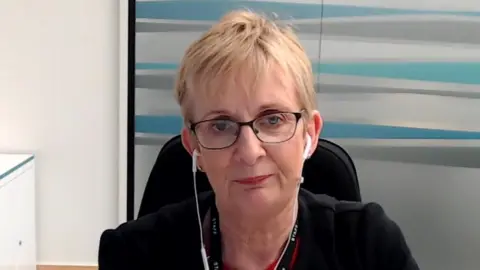
"The work that's being done by the modellers here within Welsh government is looking at various options up to about a 17% staff absence," she added.
"You'll appreciate that the NHS has coped with significant waves of Covid-19, and coped very well. It knows how to adapt.
"But yes, it will mean redeployment of staff. And we've already increased the number of staff that we've got going into this winter from the same time last year."
Ms Paget also said health boards were making plans that could see some field hospitals reopen to help speed up the release of recovered patients from hospital wards.
The warning comes as the latest NHS performance figures were published.
Figures show that NHS waiting lists in Wales have grown for the 18th successive month.
In October there were 679,626 waiting for planned treatments, more than ten thousand more than the month before and the highest number yet.
This figure equates to more than 21% of the welsh population and is 50% higher than at the start of the pandemic.
Meanwhile performance figures for A&E departments and the ambulance service have shown an improvement in the latest period.
The figures show that in November, emergency departments 67.63% of patients spent less than four hours before being admitted, transferred or discharged.
In November the ambulance service responded 53.0% of red calls (where a life is at immediate risk) within eight minutes - an improvement on the record low of 50% recorded in October.
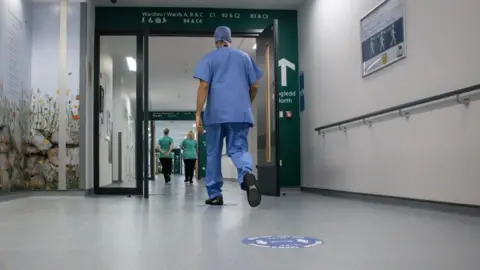 Getty Images
Getty ImagesThe Welsh government has already invested an extra £248m to transform the delivery of services and tackle waiting times.
Health Minister Eluned Morgan previously warned that "real progress" was not to be expected before the spring.
But since then, services have been further hit by the expansion of the booster programme following a rapid spread of Omicron cases.
On Thursday Wales Public Health Wales reported 3,292 new Covid cases and 10 new deaths.
"We have real concerns about the numbers of people we could see going off with Omicron and that will have an impact not just on the NHS, of course, but on the wider society as well," said Ms Morgan.
One of those concerns, she added, was that "we may see departments going down and that could really cause a huge amount of complexity and difficulty in particular areas at particular times".
Jane Baker, from Carmarthen, is one of more than 668,000 people in Wales waiting for planned treatment.
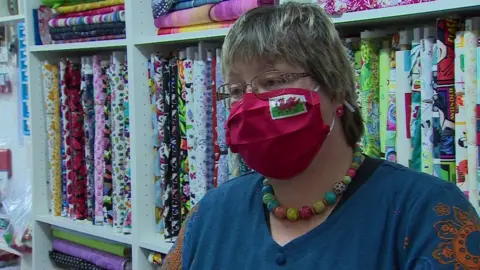
After an operation on her left hand to ease her carpal tunnel syndrome nearly three years ago, surgery she still needs to remedy the pain and numbness in her right hand has been delayed by Covid.
"But there are times when it's absolute agony and it's a hot water bottle and a bandage to try and keep things warm," said the haberdashery market stall holder.
"I use my hands all the time with sewing, it's my livelihood. So at the moment it's a bit difficult when you haven't got any feeling in your fingertips."
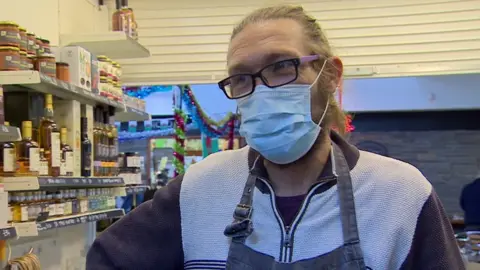
Meanwhile, Danny van Opstal, who works nearby to Ms Baker on the cheese and wine stall, is another on a lengthy waiting list.
"I've got quite a bad stomach problem, before the lockdown I had already made an appointment - that's almost two years," he said.
"I've had lots of bad nights, it's had a big impact on me. I've left milk out, sugars out, alcohol, to see where the problem is coming from, but it keeps coming back."
Both Ms Baker and Mr van Opstal were recently contacted with the offer of being seen privately - paid for by the NHS - although it's not clear whether the recent pressures brought on my Omicron will affect that.
